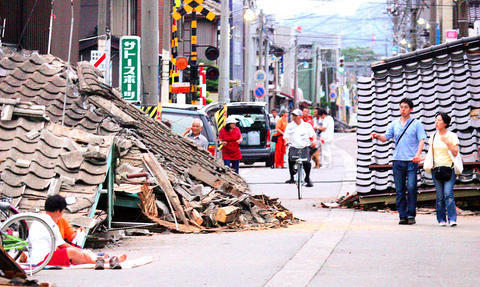A powerful earthquake rocked Japan yesterday, killing seven people and injuring more than 750 and triggering a radiation leak at one of the world's biggest nuclear plants.
In the hardest-hit areas northwest of Tokyo, homes were reduced to rubble and a bridge was nearly cracked in two by the 6.8-magnitude mid-morning quake, which also sent small tsunami waves rolling into the Japanese coast.
Water containing a "small amount of radioactive material" leaked from the Kashiwazaki-Kariwa facility, where a fire sent black smoke into the sky for hours following the killer jolt, a company spokesman confirmed.

PHOTO: AP
"But the leakage is believed to be far below the levels that could affect the environment," said Shougo Fukuda, of Tokyo Electric, which operates the plant near the epicenter of the quake.
The plant is one of the largest in the world, with four reactors supplying power to the Tokyo region.
The firm said four reactors in operation stopped automatically but a fire broke out in the area supplying electricity.
As dozens of aftershocks struck throughout the day, thousands flocked to schools and other temporary shelters to spend the night and Prime Minister Shinzo Abe broke away from election campaigning to visit the scene.
At least 753 people were injured in Niigata while two others were still missing, local officials said.
Rescue workers were hunting for anyone buried alive in the wreckage after nearly 300 buildings were flattened by the quake, which shook skyscrapers in Tokyo more than 200km from the epicenter.
The four women and three men killed, all in their 70s or 80s, died from injuries sustained in the earthquake, according to the National Police Agency.
Niigata was hit by another earthquake measuring 6.8 on the Richter scale in 2004 that killed 67 people, most of them elderly who died in the days and weeks after the first tremor from stress and fatigue.
"Even though there was a big one three years ago, you just can't get used to these quakes," said Tetsuya Oda, a 17-year-old student.
The latest quake triggered 50cm tsunami waves and was followed by some 65 aftershocks, the meteorological agency said.
More than 300 buildings were completely destroyed and another 212 were partially damaged, according to the Fire and Disaster Management Agency.
Abe, dressed in a relief worker's uniform, headed to the scene by military helicopter, cutting short a campaign stop ahead of elections on July 29.
Abe, who is struggling in opinion polls, said he gave instructions to his government that "all possible measures be taken to ensure the safety of residents, secure lifelines to them and relieve their anxieties."

People can preregister to receive their NT$10,000 (US$325) cash distributed from the central government on Nov. 5 after President William Lai (賴清德) yesterday signed the Special Budget for Strengthening Economic, Social and National Security Resilience, the Executive Yuan told a news conference last night. The special budget, passed by the Legislative Yuan on Friday last week with a cash handout budget of NT$236 billion, was officially submitted to the Executive Yuan and the Presidential Office yesterday afternoon. People can register through the official Web site at https://10000.gov.tw to have the funds deposited into their bank accounts, withdraw the funds at automated teller

PEACE AND STABILITY: Maintaining the cross-strait ‘status quo’ has long been the government’s position, the Ministry of Foreign Affairs said Taiwan is committed to maintaining the cross-strait “status quo” and seeks no escalation of tensions, the Ministry of Foreign Affairs (MOFA) said yesterday, rebutting a Time magazine opinion piece that described President William Lai (賴清德) as a “reckless leader.” The article, titled “The US Must Beware of Taiwan’s Reckless Leader,” was written by Lyle Goldstein, director of the Asia Program at the Washington-based Defense Priorities think tank. Goldstein wrote that Taiwan is “the world’s most dangerous flashpoint” amid ongoing conflicts in the Middle East and Russia’s invasion of Ukraine. He said that the situation in the Taiwan Strait has become less stable

CONCESSION: A Shin Kong official said that the firm was ‘willing to contribute’ to the nation, as the move would enable Nvidia Crop to build its headquarters in Taiwan Shin Kong Life Insurance Co (新光人壽) yesterday said it would relinquish land-use rights, or known as surface rights, for two plots in Taipei’s Beitou District (北投), paving the way for Nvidia Corp to expand its office footprint in Taiwan. The insurer said it made the decision “in the interest of the nation’s greater good” and would not seek compensation from taxpayers for potential future losses, calling the move a gesture to resolve a months-long impasse among the insurer, the Taipei City Government and the US chip giant. “The decision was made on the condition that the Taipei City Government reimburses the related

FRESH LOOK: A committee would gather expert and public input on the themes and visual motifs that would appear on the notes, the central bank governor said The central bank has launched a comprehensive redesign of New Taiwan dollar banknotes to enhance anti-counterfeiting measures, improve accessibility and align the bills with global sustainability standards, Governor Yang Chin-long (楊金龍) told a meeting of the legislature’s Finance Committee yesterday. The overhaul would affect all five denominations — NT$100, NT$200, NT$500, NT$1,000 and NT$2,000 notes — but not coins, Yang said. It would be the first major update to the banknotes in 24 years, as the current series, introduced in 2001, has remained in circulation amid rapid advances in printing technology and security standards. “Updating the notes is essential to safeguard the integrity